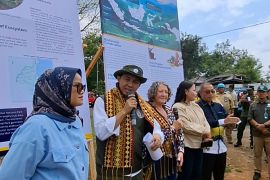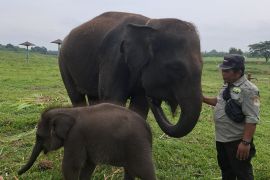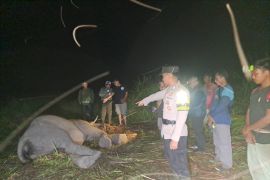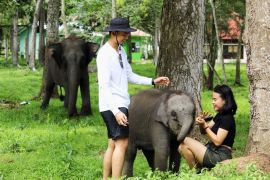Motivated by the increasing number of tourists visiting the TNWK, the first-ever female district head of East Lampung is determined to transform the park into an international tourist destination.
As more than ten thousand domestic and foreign tourists have visited TNWK during the period between January and July 2016, Chalim is optimistic that the number of visitors would continue to increase.
Moreover, the number of tourists visiting the TNWK will continue to increase in the coming years after it was recently inaugurated as the 36th ASEAN Heritage Park.
With the announcement of the TNWK as the ASEAN Heritage Park, the noted tourist attraction in East Lampung now no longer belongs to Indonesia but also to the world.
"Therefore, all relevant parties in East Lampung should actively participate in developing TNWK into an international tourist destination," Chalim remarked.
Providing an excellent bird-watching location, with the presence of the rare white-winged wood duck, the TNWK is home to critically endangered species, such as the Sumatran tigers, Sumatran elephants, and Sumatran rhinos.
With lowland rainforest as well as swamp, mangrove, and dry beach forests along with expanses of grassland, this national park is an ideal habitat for thousands of different species and offers exciting opportunities for visitors to experience some of Indonesias most diverse wildlife.
"Hence, we are making efforts to develop Way Kambas and transform it into a national and international tourist destination," the East Lampung district head emphasized.
The TNWK is an icon of East Lampung District and has been visited and known by people, both nationally and internationally, Nunik, as she is commonly called, noted.
East Lampung District is a rich, beautiful, and interesting area, with friendly people and several tourist attractions, she asserted.
The Great Hall of TNWK is also formulating a strategy to utilize trained domesticated elephants in the Elephant Conservation Center as a tourist attraction, according to Nunik.
In the meantime, TNWK Great Hall Public Relations Chief Sukatmoko said he was awaiting the governments ruling on the use of the Elephant Conservation Center as a tourist destination.
"We are still awaiting the ruling of the Ministry of Environment and Forestry on the utilization of the elephants, so it can be enjoyed more by the visitors," Sukatmoko remarked.
He stated that the TNWK Great Hall was currently working on a plan to develop an ecotourism village as a secondary destination for visitors.
Sukatmoko noted that the tourists visiting the ecotourism village in TNWK will be able to experience the extensive flora and fauna and have the opportunity to witness and learn about the endangered Sumatran elephant, rhinoceros, and tiger along with a vast array of other exotic animals, such as monkeys, tapirs, leopards, and birds.
"The development of ecotourism aims at increasing the number of tourist visits to TNWK in addition to boosting the economy of the local community," Sukatmono affirmed.
He further explained that the ecotourism village also offered homestays, various handicrafts of the local village, and a variety of cuisines typical to the region for the visitors.
According to Sukatmono, the Great Hall of TNWK is collaborating with local NGOs to develop and manage the ecotourism village.
Given its numerous tourist attractions, the Indonesian province of Lampung has been encouraged to develop its tourism sector as an important source of foreign exchange and employment.
The rapid expansion of the tourism sector in Lampung Province is expected to provide viable opportunities for sustainable development and poverty reduction.(*)
Reporter: Hisar Sitanggang and Muklasin
Editor: Heru Purwanto
Copyright © ANTARA 2016









